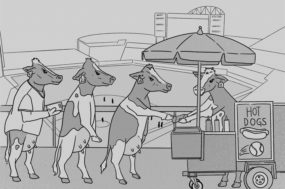Ronan puts his hand on my shoulder. “Ryan,” he says. “Do you have the soul inside you?” Ronan had started his own radio show on the university station and invited me into a recording session.
The City of Soul is an hour of soul music every other Thursday evening, with the usual banter between some songs. “Put on those headphones,” he said. “You can be my first guest.”
While it could be argued I have a face for radio, the other attributes didn’t follow so naturally. There’s something about having your own voice filling your ears that erases the ability to feel like yourself. I was conscious of every time I stumbled or stuttered, which felt like every sentence.
To keep the talk from sounding canned, we didn’t rehearse it; instead Ronan brought up new conversational topics every time, all of which I met with banal responses that came back to me in the headset.
I admitted on air I didn’t know anything about soul while watching the monitor to ensure the volume of my voice stayed within the appropriate levels. I had to be conscious not to scratch my beard, smack my lips or breathe too hard through my nose – all of which the microphone picked up. In the end the experience was like a carnival game: enjoyable while emphasizing how much harder it was than it seemed.
“Good times,” Ronan said as we hung up our headsets. “You want to make this a regular thing?”
Earlier that day, I had told Ronan I had the soul inside me, but when push came to shove, I wasn’t so sure. These were singers who lived through oppression and discrimination, singing for people who had done the same. I had milked cows, bedded stalls and spread manure. I didn’t grow up on the streets on the wrong side of the tracks. I was in a tractor cab all day. I raised rabbits for the 4-H show. Was that soul enough?
I had to come up with a “gig guide” for every show, detailing the music scene in the area, as well as find Irish connections to some of the songs – a requirement since the station was sponsored by the university, and the university was funded by the Irish government. Ronan did most of the heavy lifting, including creating a playlist and editing the recording, the latter of which always took him six hours.
There was no doubt he was the pro. His Monaghan accent came across clear and polished, while my voice sounded awkward and heavy. I made the mistake of asking my girlfriend what she thought of my performance.
“You always sound fake at the beginning,” she said.
I asked Ronan if I sounded fake. He told me I had a hard woman.
I went back to her and told her Ronan thought she was hard.
“Well,” she said. “If he has to spend six hours editing every show, he’s obviously not working with a talent.”
Ronan became increasingly excited about The City of Soul. He brought in one of our female colleagues to record some jingles and booked extra studio time to build a collection of additional openings and transitions between songs, should we ever need them.
He even created the website (The City of Soul) for listeners to send in their requests or listen to past shows. None of the station’s other programs had done that. I wasn’t sure if I was contributing at a .com level yet – I felt like a .net amateur still. Maybe even a .biz some days.
I was eating lunch with Jackie, an academic. I told her I was doing a soul program.
“Great,” she said. “You can invite me on, and I’ll explain to you why it’s inappropriate for a white person to have a soul show.”
In my head, I said this: Music is the most egalitarian expression there is, to be enjoyed and appreciated by people of every race, gender and experience. In fact, soul music was influential in combating segregationist ideas during the civil rights movement. Blue-eyed soul was the term for white artists singing soul, traced back to the success of The Righteous Brothers.
Instead, in reality, I did this – grew red until I yelled “Righteous Brothers! Righteous Brothers!” at her and walked away.
One benefit of trying something new is: It often leaves one with new appreciations. I had thought the radio deejays on all my favorite stations were just “talking” between songs, but now I understand all it takes to come across natural, clear and full of energy. I’m still working on saying things that makes sense.
Sometimes I regret what leaves my mouth. Once, I had meant to call James Brown the Godfather of Funk, but the last word missed a consonant. When Ronan asked me on air if I had always been a fan of soul music, I told him I grew up on a farm, where there was only country on radio. Then I said I had left country music for soul. It just came out – I hadn’t planned on saying that, and I didn’t mean it. The next day I received a three-word message from a friend and country music enthusiast: “Who are you?”
Show biz is tough. I told Ronan if The City of Soul gets syndicated, he has every right to dump me for the sake of the program. I don’t want to be the man that holds him back in the Irish soul scene. I could always beg for forgiveness among the country music fans. Until that happens, however, this blue-eyed soul farmer’s son will do his best to take his rough-cut voice to the airwaves and drop some funky tunes on anyone who will listen. ![]()
Ryan Dennis is the son of a former dairy farmer from western New York and a literary writer.





